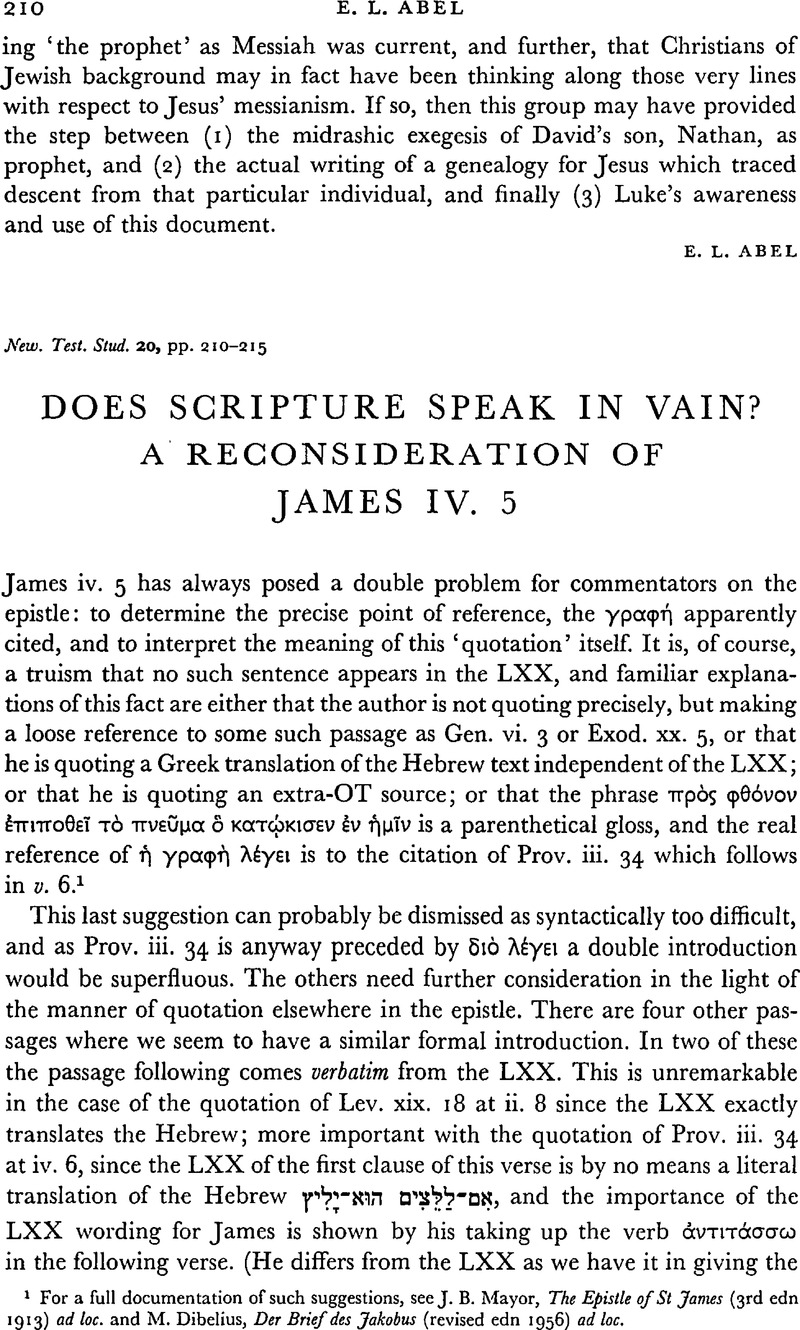Article contents
Does Scripture speak in vain? A Reconsideration of James iv. 5
Published online by Cambridge University Press: 05 February 2009
Abstract

- Type
- Short Studies
- Information
- Copyright
- Copyright © Cambridge University Press 1974
References
page 210 note 1 For a full documentation of such suggestions, see Mayor, J. B., The Epistle of St James (3rd edn 1913)Google Scholar ad loc. and Dibelius, M., Der Brief des Jakobus (revised edn 1956)Google Scholar ad loc.
page 212 note 1 The λέγει of iv. 6 surely understood to have the same general subject as the λέλει of iv. 5, γραϕή, though not be the identical ‘saying’.
page 213 note 1 For example, зηλωτής is used only to translate ![]() which in turn is used only of God; παραзηλόω translates
which in turn is used only of God; παραзηλόω translates ![]() in respect of God,
in respect of God,![]() in respect of man. The verb зηλόω, primary translation of ℵℷ┬|ℸ┬, and noun зῆλος, invariable translation of |ℸℵ┬ℷ|ℸ. and having no other role, are used more generally of human emotions, but a substantial proportion of their use relates to the divine ‘jealousy’, and a further number to those individuals who, like Phineas, Samuel and the Maccabees, were ‘jealous for God’.
in respect of man. The verb зηλόω, primary translation of ℵℷ┬|ℸ┬, and noun зῆλος, invariable translation of |ℸℵ┬ℷ|ℸ. and having no other role, are used more generally of human emotions, but a substantial proportion of their use relates to the divine ‘jealousy’, and a further number to those individuals who, like Phineas, Samuel and the Maccabees, were ‘jealous for God’.
page 213 note 2 Wisd. Sol. ii. 24, vi. 23; IMacc. viii. 16; 3 Macc. vi. 7. In the NT, χωόνος is the motive for the High Priest's denunciation of Jesus in Mark xv. 10 // Matt. xxvii. 18 and otherwise appears only in lists of vices: Gal. v. 21, Rom. i. 29, I Tim. vi. 4, Tit. iii. 3 and I Pet. ii. 1.
page 213 note 3 The verse could perhaps be read, as by the JB, as a question: ‘Does the Spirit of God behave in this way?’, with the implied sequel ‘Then neither shoudl you’; but the absence of comparable reference to the Spirit in the epistle remains a difficulty.
page 214 note 1 ΣαΒαώω is peculiar to the Isaiah translator, other translators disliking the transliteration and preferring to translate κυρίος τών δυνάμεων or παντοκράτωρ. It only otherwise appears in the NT in Paul's quotation of Isa. i. 9 in Rom. ix. 29. It is possible in addition to the obvious allusion that James takes up the κραυγή of Isa. v. 7 in the cry, ![]() , of his workmen.
, of his workmen.
page 214 note 2 Deut. xiii. 8, xxxii. 11; Pss. xli. 2, lxi. 10, lxxxiii. 3, cxviii. 20, 131 and 174; Wisd. Sol. xv. 19; Ecclus xxv. 21; Ep.Jer. xiii. 14.
page 215 note 1 The rhetorical question is a feature of James's style: ii. 4, ii. 5, ii. 25, iv. 12. Often the argument proceeds from an implied response: ii. 15, ii. 19, iii. 13, iv. 4, v. 13. A sequence of two questions as suggested here can also be paralleled: ii. 6–7, ii. 14, ii. 20–1, iii. 11–12 and iv. 1. The RV seems, in this respect, the best translation of iv. 5, and Souter's punctuation is preferable to that of Nestlé.
page 215 note 2 A further link between the epistle and this psalm might be found in the use by both of the unusual title νομοθήτης/ό νομοθετῶν for God (Jas iv. 12, Ps. lxxxiii. 7). It is a psalm one would expect to pass early into Christian use because of its reference in v. 10 to τό πρόσωπον τού ![]() ριστού σου but it is not quoted elsewhere in the NT, nor can I trace it in the Apostolic Fathers or Justin.
ριστού σου but it is not quoted elsewhere in the NT, nor can I trace it in the Apostolic Fathers or Justin.
- 2
- Cited by


